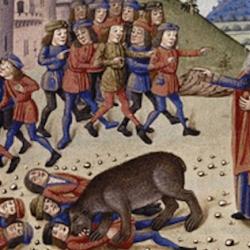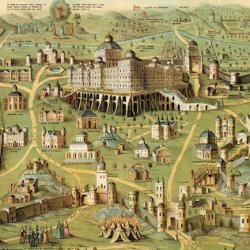INTRODUCTION
Solomon was set up on a throne like a new Adam, but like Adam he seized the forbidden fruit of foreign women, and fell from his throne. Before chapter 11 is over, Solomon is trying to kill Jeroboam, making him a Cain as well as a fallen Adam. As at the beginning of his reign, Solomon faces three challengers to his throne (Adonijah, Joab, Abiathar; Rezon, Hadad, Jeroboam). The second time around, he cannot control his rivals, and loses a large part of the kingdom.
THE TEXT
?But King Solomon loved many foreign women, as well as the daughter of Pharaoh: women of the Moabites, Ammonites, Edomites, Sidonians, and Hittites ?Efrom the nations of whom the Lord had said to the children of Israel, ?You shall not intermarry with them, nor they with you. Surely they will turn away your hearts after their gods.?E Solomon clung to these in love . . . .?E(1 Kings 11:1-43).
STRUCTURE
The parallels between chapters 1-2 and chapter 11 suggest an overall frame for the Sol narratives:
a. Sol?s ascension and triumph over challenge of Adonijah, chs 1-2
b. Sol?s dream, his wisdom, and Israel?s prosperity, chs 3-4
c. Temple building and dedication, chs 5-8
b?E Sol?s dream, wisdom, and Israel?s international repute, chs 9-10
a?E Sol?s fall and three rivals, ch 11
Chapter 11 too is arranged chiastically:
1. Sol?s sin, vv 1-8
2. Lord?s judgment on Sol?s sin, vv 9-13
3. Hadad and Rezon (both ?satans,?E, vv 14-25
2?E Jeroboam: centers on Ahijah?s announcement of judgment, vv 26-40
1?E Sol?s death, vv 41-43
This structure highlights the movement from sin to death.
SOLOMON?S FALL
The beginning of chapter 11 refers back to the beginning of chapter 3 as well. Solomon marries Pharaoh?s daughter, but he continues to love Yahweh (3:1ff.). When he marries the other foreign women, he is drawn away to love them. His love for Yahweh leads him to build the temple of Yahweh, but his love for foreign women leads him to build shrines for idols. Instead of ?clinging to Yahweh?Eas the law requires (Deuteronomy 10:20; 11:22; 13:5; 30:20), he ?clings to?Ethe foreign women, and their gods. When David ?did evil?Ein seizing a married woman (2 Samuel 11-12), the kingdom was divided temporarily. Now, Solomon does evil in taking many women, and the result will be a longer-standing breach in the kingdom.
Solomon?s idolatry is not a passing attraction. He becomes a polytheist, though no doubt he continues to think of Yahweh as the chief of the pantheon. One of the most serious violations is to put an idolatrous shrine right on the Mount of Olives, just to the east of the Temple Mount. This places the shrine right before the face of Yahweh, who would ?look out?Eof the temple toward the east and see this abomination.
The sin is basically Solomon?s, but verse 33 is plural, and indicates that the nation of Israel followed Solomon in his idolatries. Solomon, as the representative ?son of God,?Eleads Israel, the corporate ?son of God?Eastray. In doing this, Solomon is deeply alienated from himself. Verse 4 says that Solomon?s heart was not ?complete?Ewith Yahweh, and uses a word that is the root of Solomon?s own name ( shelem ). Solomon ceases to be Solomon when he goes after other gods.
Because of Solomon?s sins, the kingdom is ?torn?Efrom him (v. 11), and this is symbolized by Ahijah?s tearing of a garment (v. 30). Yet, Yahweh delays the punishment and ameliorates it by promising that the kingdom will not be completely taken from the house of David. The Lord remains faithful to the house of David for David?s sake (vv. 12-13).
SATANS
To discipline Solomon during his lifetime, Yahweh raises up three adversaries, two of which are called ?satans?E(vv. 14, 23). The three adversaries come from three different categories of people. Hadad is an Edomite, a descendant of Esau. All Israel-Edom conflicts in the OT are a continuation of the original enmity of Jacob and Esau. Rezon is a Gentile, who reigns in Damascus, the capital of Syria or Aram. Jeroboam is an Israelite. These are the same three groups that oppose Jesus: Herod is an Edomite; the Romans are Gentiles; and the Jewish leaders.
Chapter 11 gives a brief biography of each, and the details of these biographies are worth noting. Hadad?s story (vv. 14-22) reminds us of the history of Israel: Hadad is carried to Egypt, where, like Joseph, he is treated kindly by Pharaoh, and even marries into the Egyptian royal family. When David dies, he returns to his land and this gives him sufficient power to make life miserable for Solomon. In this story-line, Solomon is playing the role of the Canaanites, opposed by an Edomite who has just gone through an ?exodus?Efrom Egypt. This is a wonderfully appropriate irony; Solomon marries Canaanites (11:1), and so he is treated as a Canaanite.
Rezon the son of Eliada?s story also parallels a story from Israel?s history (vv. 23-25). Rezon is threatened by his king, Hadadezer, as David was threatened and persecuted by Saul. Rezon goes into the wilderness and begins to gather a band of men, as David did in the wilderness (cf. 1 Samuel 22:1-2). Then he moves to Damascus to become king over Syria, just as David set up his kingdom in Hebron. If Hadad is a counterfeit Israel, Rezon is a counterfeit David.
The longest story is that of Jeroboam (vv. 26-40), and his biography too reminds us of earlier biblical history. Like David, Jeroboam is a faithful servant to his king. Just as Samuel anointed David to be Saul?s successor, so Ahijah designates Jeroboam to be Solomon?s successor (note the ?torn robe?Etheme in 1 Samuel 15:24-31). Saul persecuted the anointed David, and Solomon attempts to kill Jeroboam when he learns of Ahijah?s promise (1 Kings 11:40). David fled from Saul to the Philistines, just as Jeroboam flees from Solomon into Egypt. David returned from Philistia to take the kingdom, and Jeroboam will return from Egypt to take control of the northern tribes (1 Kings 12). Jeroboam?s story also is a replay of Israel?s history in a number of respects. Even the promise to Jeroboam sounds like the promises Yahweh made to David (1 Kings 11:38-39; cf. 2 Samuel 7).
CONCLUSION
The whole history of Kings is contained in this chapter. When Yahweh raises up adversaries against Solomon, He raises up adversaries that are mirror images of the Davidic kingdom. He raises up counterfeit Davids to plague the house of David. Yet, in the midst of judgment, Yahweh remembers mercy, and promises that He will not destroy the house of David completely (11:12-13, 34-36), so that the lamp of David will not be snuffed out.
One other key theme of Kings emerges in this chapter: the effectiveness of the word of the prophet. Kings is the story of power politics, but Kings also makes it clear that what drives history is not power politics but the word of Yahweh. Ahijah?s word to Jeroboam comes to pass. The word of the Lord never returns void.











